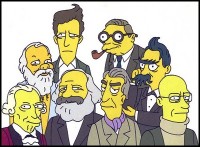Johann Hari
http://www.independent.co.uk/opinion/commentators/johann-hari/johann-hari-why-should-i-respect-these-oppressive-religions-1517789.html
Whenever a religious belief is criticised, its adherents say they’re victims of ‘prejudice’
The right to criticise religion is being slowly doused in acid. Across the world, the small, incremental gains made by secularism – giving us the space to doubt and question and make up our own minds – are being beaten back by belligerent demands that we “respect” religion. A historic marker has just been passed, showing how far we have been shoved. The UN rapporteur who is supposed to be the global guardian of free speech has had his job rewritten – to put him on the side of the religious censors.
The Universal Declaration of Human Rights stated 60 years ago that “a world in which human beings shall enjoy freedom of speech and belief is the highest aspiration of the common people”. It was a Magna Carta for mankind – and loathed by every human rights abuser on earth. Today, the Chinese dictatorship calls it “Western”, Robert Mugabe calls it “colonialist”, and Dick Cheney calls it “outdated”. The countries of the world have chronically failed to meet it – but the document has been held up by the United Nations as the ultimate standard against which to check ourselves. Until now.
In other words, you can say anything you like, as long as it precisely what the reactionary mullahs tell you to say. The declaration makes it clear there is no equality for women, gays, non-Muslims, or apostates. It has been backed by the Vatican and a bevy of Christian fundamentalists.
Incredibly, they are succeeding. The UN’s Rapporteur on Human Rights has always been tasked with exposing and shaming those who prevent free speech – including the religious. But the Pakistani delegate recently demanded that his job description be changed so he can seek out and condemn “abuses of free expression” including “defamation of religions and prophets”. The council agreed – so the job has been turned on its head. Instead of condemning the people who wanted to murder Salman Rushdie, they will be condemning Salman Rushdie himself.
Anything which can be deemed “religious” is no longer allowed to be a subject of discussion at the UN – and almost everything is deemed religious. Roy Brown of the International Humanist and Ethical Union has tried to raise topics like the stoning of women accused of adultery or child marriage. The Egyptian delegate stood up to announce discussion of shariah “will not happen” and “Islam will not be crucified in this council” – and Brown was ordered to be silent. Of course, the first victims of locking down free speech about Islam with the imprimatur of the UN are ordinary Muslims.
Here is a random smattering of events that have taken place in the past week in countries that demanded this change. In Nigeria, divorced women are routinely thrown out of their homes and left destitute, unable to see their children, so a large group of them wanted to stage a protest – but the Shariah police declared it was “un-Islamic” and the marchers would be beaten and whipped. In Saudi Arabia, the country’s most senior government-approved cleric said it was perfectly acceptable for old men to marry 10-year-old girls, and those who disagree should be silenced. In Egypt, a 27-year-old Muslim blogger Abdel Rahman was seized, jailed and tortured for arguing for a reformed Islam that does not enforce shariah.
To the people who demand respect for Muslim culture, I ask: which Muslim culture? Those women’s, those children’s, this blogger’s – or their oppressors’?
As the secular campaigner Austin Darcy puts it: “The ultimate aim of this effort is not to protect the feelings of Muslims, but to protect illiberal Islamic states from charges of human rights abuse, and to silence the voices of internal dissidents calling for more secular government and freedom.”
Those of us who passionately support the UN should be the most outraged by this.
Underpinning these “reforms” is a notion seeping even into democratic societies – that atheism and doubt are akin to racism. Today, whenever a religious belief is criticised, its adherents immediately claim they are the victims of “prejudice” – and their outrage is increasingly being backed by laws.
All people deserve respect, but not all ideas do. I don’t respect the idea that a man was born of a virgin, walked on water and rose from the dead. I don’t respect the idea that we should follow a “Prophet” who at the age of 53 had sex with a nine-year old girl, and ordered the murder of whole villages of Jews because they wouldn’t follow him.
I don’t respect the idea that the West Bank was handed to Jews by God and the Palestinians should be bombed or bullied into surrendering it. I don’t respect the idea that we may have lived before as goats, and could live again as woodlice. This is not because of “prejudice” or “ignorance”, but because there is no evidence for these claims. They belong to the childhood of our species, and will in time look as preposterous as believing in Zeus or Thor or Baal.
When you demand “respect”, you are demanding we lie to you. I have too much real respect for you as a human being to engage in that charade.
But why are religious sensitivities so much more likely to provoke demands for censorship than, say, political sensitivities? The answer lies in the nature of faith. If my views are challenged I can, in the end, check them against reality. If you deregulate markets, will they collapse? If you increase carbon dioxide emissions, does the climate become destabilised? If my views are wrong, I can correct them; if they are right, I am soothed.
But when the religious are challenged, there is no evidence for them to consult. By definition, if you have faith, you are choosing to believe in the absence of evidence. Nobody has “faith” that fire hurts, or Australia exists; they know it, based on proof. But it is psychologically painful to be confronted with the fact that your core beliefs are based on thin air, or on the empty shells of revelation or contorted parodies of reason. It’s easier to demand the source of the pesky doubt be silenced.
But a free society cannot be structured to soothe the hardcore faithful. It is based on a deal. You have an absolute right to voice your beliefs – but the price is that I too have a right to respond as I wish. Neither of us can set aside the rules and demand to be protected from offence.
Yet this idea – at the heart of the Universal Declaration – is being lost. To the right, it thwacks into apologists for religious censorship; to the left, it dissolves in multiculturalism. The hijacking of the UN Special Rapporteur by religious fanatics should jolt us into rescuing the simple, battered idea disintegrating in the middle: the equal, indivisible human right to speak freely.
j.hari@independent.co.uk
U.N. Panel OKs Measure on Islam
by Eliane Engeler, AP
http://www.huffingtonpost.com/huff-wires/20070330/un-islam
GENEVA — Islamic countries pushed through a resolution at the U.N. Human Rights Council on Friday urging a global prohibition on the public defamation of religion _ a response largely to the furor last year over caricatures published in a Danish newspaper of the Muslim Prophet Muhammad.
The statement proposed by the Organization of Islamic Conference addressed what it called a “campaign” against Muslim minorities and the Islamic religion around the world since the Sept. 11, 2001 terrorist attacks on the United States.
The resolution, which was opposed by a number of other non-Muslim countries, “expresses deep concern at attempts to identify Islam with terrorism, violence and human rights violations.”
It makes no mention of any other religion besides Islam, but urges countries “to take resolute action to prohibit the dissemination of racist and xenophobic ideas and material aimed at any religion or its followers that constitute incitement and religious hatred, hostility, or violence.”
The resolution was adopted by a 24-14 vote with nine abstentions. Canada, Japan and South Korea joined European countries in opposition, primarily citing its excessive focus on Islam and incompatibility with fundamental rights such as the freedoms of speech and thought.
“The problem of religious intolerance is worldwide and not limited to certain religions,” said Brigitta Maria Siefker-Eberle of Germany, speaking on behalf of the 27-nation European Union.
There are 17 Muslim countries in the 47-nation human rights council. Their alliance with China, Cuba, Russia and most of the African members means they can almost always achieve a majority.
Human Rights Watch said the resolution could endanger the basic rights of individuals.
The council, which last year replaced the discredited U.N. Human Rights Commission, has no power beyond drawing international attention to rights issues and scrutiny of abuses in certain countries.
The move at the council was initiated last year after protests across the Islamic world drew attention to caricatures of Muhammad first printed in Danish paper Jyllands-Posten in September 2005.










